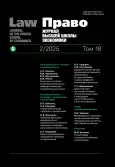International Legal Foundations of Interaction Between International Organizations: Theory and Contemporary Challenges
- Authors: Chuvakhin P.1
-
Affiliations:
- Moscow State Institute of International Relations (University), Ministry of Foreign Affairs of the Russian Federation
- Issue: Vol 18, No 2 (2025)
- Pages: 245-271
- Section: Law in the Modern World
- URL: https://journal-vniispk.ru/2072-8166/article/view/317619
- DOI: https://doi.org/10.17323/2072-8166.2025.2.245.271
- ID: 317619
Cite item
Full Text
Abstract
The article presents a comprehensive study of the theoretical and legal foundations of inter-organizational relations in international law. The research analyzes the legal nature of relations between international organizations as a manifestation of their international legal personality and an essential element of the modern international legal order. The historical evolution of international legal regulation of these relations is examined, from the League of Nations period through the post-war formation of the UN system to modern complex forms of interaction. Based on a systematic analysis of international legal acts and practice of interaction between international organizations, a multi-level classification of inter-organizational cooperation forms has been developed according to legal nature (contractual, institutional, functional), degree of formalization (formalized and informal), content (normative, operational, institutional), sphere of activity, and interaction pattern (coordination, subordination, cooperation). The legal foundations of inter-organizational relations are thoroughly examined, including statutory provisions of organizations, various types of inter-organizational agreements, and acts of international organizations’ bodies. The main legal forms of cooperation are considered in detail: membership of some organizations in others, observer status and other forms of participation in the work of bodies, representation of international organizations, and the establishment of joint bodies, programs, and projects. Special attention is paid to the legal regulation of relations between universal and regional organizations, with four models identified: subordination, coordination, complementarity, and competition. Using practical cases (UNAMID, interaction between WTO and IMF, hybrid peacekeeping missions), the article analyzes key legal problems of inter-organizational cooperation: delimitation of competence, distribution of international responsibility, institutional fragmentation, asymmetry of influence, and insufficient transparency. Approaches to resolving problem of competing competence between organizations are examined, including inter-organizational agreements, principles of specialization and hierarchy. The research demonstrates the impact of contemporary global challenges (digitalization, COVID-19 pandemic, climate crisis) on the transformation of legal mechanisms for interaction between international organizations. The author proposes specific directions for improving the legal regulation of inter-organizational relations, including the development of more detailed agreements, creation of a unified legal framework for regulating joint bodies and programs, and formation of independent mechanisms for monitoring and evaluating the purpose of cooperation.
About the authors
P. Chuvakhin
Moscow State Institute of International Relations (University), Ministry of Foreign Affairs of the Russian Federation
Email: chuvakhin.petr@yandex.ru
ORCID iD: 0000-0002-6026-1750
References
- Blokker N. (2004) International Organizations and Their Members. International Organizations Law Review, vol. 1, no. 1, pp. 139–161.
- Boisson de Chazournes L. (2017) Interactions between Regional and Universal Organizations: A Legal Perspective. Leiden: Martinus Nijhoff, 382 p.
- Clarke L. (2011) Responsibility of International Organizations under International Law for the Acts of Global Health Public-Private Partnerships. Chicago Journal of International Law, vol. 12, pp. 55–84.
- Cremona M. (2011) External Relations and External Competence of the European Union. In: H. Craig, G. de Búrca (eds.) The Evolution of EU Law. Oxford: University Press, pp. 217–268.
- Fischer-Lescano A., Teubner G. (2006) Regime-Kollisionen: Zur Fragmentierung des globalen Rechts. Frankfurt am Main: Suhrkamp, 230 p.
- Kapustin A.Ya. (2010) International Organizations in a Globalizing World. Moscow: RUDN, 320 p. (in Russ.)
- Kingsbury B., Krisch N., Stewart R.B. (2005) The Emergence of Global Administrative Law. Law and Contemporary Problems, vol. 68, no. 3, pp. 17–21.
- Klabbers J. (2015) An Introduction to International Organizations Law. 3rd ed. Cambridge: Cambridge University Press, 424 p.
- Lukashuk I.I. (2004) Law of International Liability. Moscow: Wolters Kluwer, 432 p. (in Russ.)
- Neshataeva T.N. (1998) International Organizations and Law. New Trends in International Legal Regulation. Moscow: Delo, 272 p. (in Russ.)
- Reinisch A. (2013) The Immunity of International Organizations and the Jurisdiction of their Administrative Tribunals. Chinese Journal of International Law, vol. 12, pp. 175–190.
- Schermers H.G., Blokker N.M. (2018) International Institutional Law. 6th ed. Leiden: Brill, 1273 p.
- Wellens K. (2002) Remedies against International Organizations. Cambridge: University Press, 295 p.
- Velyaminov G.M. (2015) International Law: Experiences. Moscow: Statut, 1006 p. (in Russ.)
- Wolfrum R. (2011) Cooperation, International Law of. In: Max Planck Encyclopedia of Public International Law. Oxford: University Press, pp. 85–92.
- Zaum D. (ed.) (2013) Legitimating International Organizations. Oxford: Oxford Academic, 272 p.
Supplementary files








